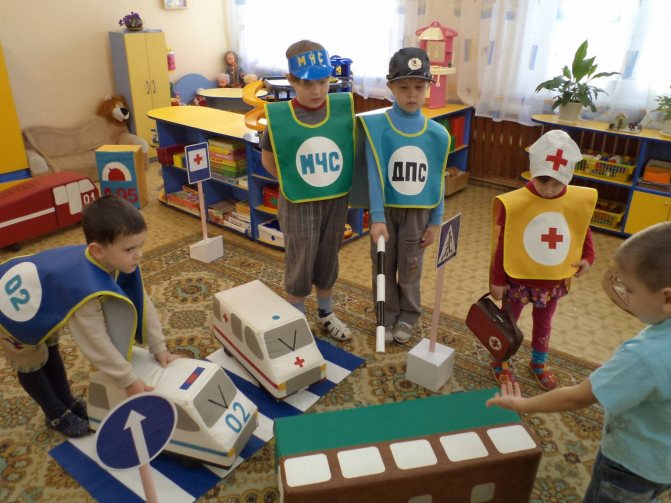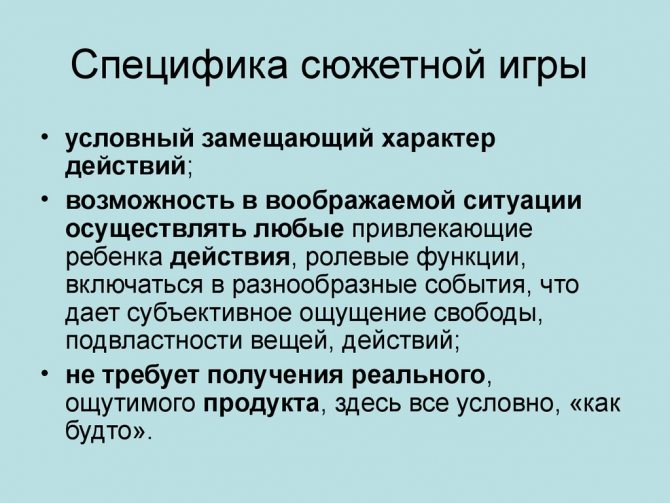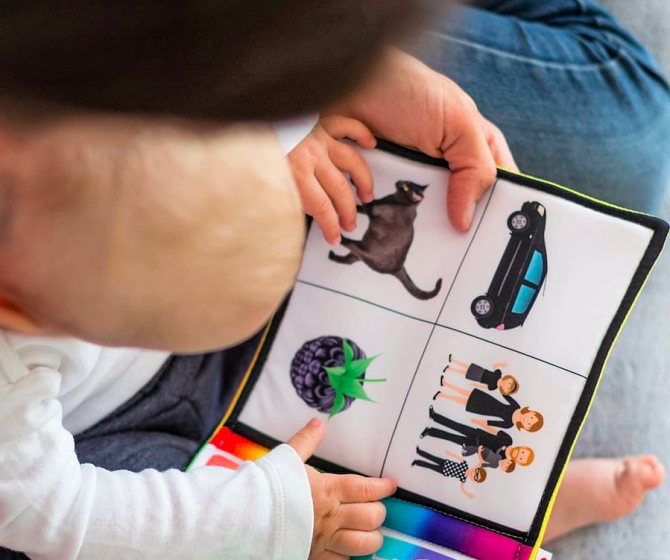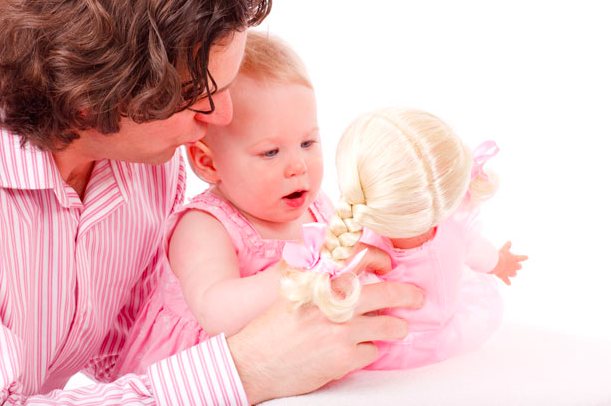During pregnancy
A reminder for future parents - the child must be desired . Many couples in society have begun to take a more responsible approach to family planning and this is commendable. The baby should be born to a couple who can satisfy his needs in the best possible way. Even if conception did not occur as planned, the life of the embryo has already begun and has the right to exist.
Raising a child begins not from the moment of birth, but from the moment of conception.
This encourages parents to approach family planning with all responsibility - should they have children, when and how many? These issues are best discussed during courtship. Unfortunately, some couples become aware of their difference of opinion after conception. They have to quickly change their plans for life and sometimes it is not so easy. Remember that your baby is worthy of love and care!
Therefore, age “0” is the moment of conception, not birth.
The task of the future father and mother is to ensure healthy conception and intrauterine development of the fetus, as far as possible. What can parents do?
Healthy lifestyle.
- It is important to balance your diet as much as possible. Research confirms that acute deficiency of certain elements negatively affects the intrauterine development of the fetus. Food can be “medicine,” so don’t take synthetic vitamins unless absolutely necessary. Tools are now available to diagnose the body for important elements. After the results, you need to consult a doctor and adjust your diet and lifestyle.
- Give up bad habits.
- Less stress . Anxious mothers give birth to anxious children. There will still be a lot of stress in life, so you need to try to ensure a happy childhood. If the stress is related to work, then some mothers decide to go on maternity leave rather than work until the birth.
- Get enough sleep.
- Before conceiving, undergo the necessary treatment for yourself, because many procedures are prohibited during pregnancy.
- Try not to drink alcohol in the days or weeks before conceiving. Alcohol affects not only the quantity of sperm, but also their quality.
- Complete all necessary medical examinations during pregnancy on time. Register on time.
- Avoid any infection during pregnancy! Infections are very dangerous for the fetus.
- Avoid hitting the stomach.
- Take courses for expectant mothers . You will be provided with individual, practical advice. Share information from the courses with your husband.
- Make sure you find a good doctor for childbirth in advance and pack the necessary things.
- Even the fetus needs a sense of security on a subconscious level. We need to help the fetus feel wanted.
- Think positively about your pregnancy. Surprisingly, unwanted children experience more difficulties in life than wanted children.
- Play some nice music. Read useful literature aloud. It has been proven that the fetus already hears music and the quality of this music will determine its musical tastes in life.
- Stroke the belly and at the same time say something good to the fetus.
- Wear comfortable maternity underwear.
- Connect with friends more and limit your interactions with negative people. A mother’s healthy nervous system is the key to the child’s mental health.
- Watch positive movies and engage in favorite and safe hobbies . This leads to the production of the happiness hormone.
- Read something new and interesting and this will help the intellectual development of the fetus.
Healthy parents - healthy baby!
Play activities at the age of 5-6 years
Just as before, the leading activity between the ages of 5 and 6 is still playing. However, as the child grows up, she acquires new, previously uncharacteristic features.
Role-playing games for children most actively enter into a child’s life starting from senior preschool age.
Points for monitoring child development at 5-6 years old
Their distinctive feature is that the child no longer performs a certain set of actions, but models his behavior, adapting it to the role he plays. The game exhibits such features as plot and content. The content of the game shows what exactly underlies the game actions. As a rule, children are able to grasp only the visible, external side, but they quite clearly understand what representatives of certain professions, various social groups, etc. do. The plot allows you to structure the game and organize the actions of its participants.

Role-playing games come to the fore
Having sufficient experience in object-based activities, children aged 5-6 years actively use not only the objects themselves, but also their substitutes during play. In this way, an imaginary situation (or imaginary) is formed, where the child uses existing experience and gains new experience. However, the relationships between children are very real.
In addition, by participating in role-playing games, the child learns to coordinate and coordinate his actions with other participants in the process, acquiring important socialization skills.

Summarizing the role of the game, we can outline its main functions in the senior preschool period:
- The game promotes the development of arbitrariness of mental processes.
- Egocentrism in thinking is overcome. The child learns to accept the point of view of other people and mentally take their place.
- The creativity in the child develops.
- The sign function of speech is enhanced.
From birth to one year
Caring for a baby requires 24-hour attention. The family needs to organize their lives in such a way as to be able to satisfy both their own and his needs. Helping your child see this world objectively is a huge honor and responsibility. First impressions greatly affect his development and life. The first impression can only be made once.
Physical needs of the child.
A small body is very vulnerable to external factors, so you should carefully take care of comfort. All questions should be discussed more specifically with your pediatrician.
- Temperature regime . Both overheating and hypothermia are undesirable. Monitor the temperature of your arms and legs. Ventilation of the room is very important. Watch for cool air flowing from a window or air conditioner. While ventilating, it is better to move away from the source of cool air.
- Walking in the fresh air is necessary to strengthen the immune system and produce vitamin D. Dress him and yourself according to the weather. Sometimes it's worth taking spare things.
- Hardening should be discussed with your doctor.
- Usually you need to get advice about water procedures, the temperature of the water for swimming and how often to do it.
- The best food for a newborn is mother's milk. It is balanced in vitamins and microelements.
- It is better to use natural fabrics that can be easily cleaned and reused. Cotton, linen and natural wool absorb moisture well and provide good ventilation for the body.
- Children's clothes should be washed separately from adults and at higher temperatures for disinfection. Microbes die at temperatures of 60 degrees and above.
Emotional and intellectual needs
- The most important person to whom a child is attached is his mother. You need to create a warm and cozy emotional atmosphere in the house. Some couples think that the little one doesn’t understand anything, but that’s not true.
- The child's subconscious absorbs everything like a sponge.
- Eye contact. It is noticed that the baby seeks eye contact with his parents to determine their mood. While he does not speak, you need to listen to the child by his gestures and sounds. Facial expression serves as a signal of anxiety or calm.
- A smile is the universal signal “Everything is fine”
- Touching . Tactile sensations reassure you of love and safety. If the mother rarely touches the baby, he will feel that he is not needed and this can lead to low self-esteem in the future.
- Massage sometimes has medical indications, but also simple stroking will very well strengthen the baby’s nervous system. Gently press it to your chest.
- If spouses respect and praise each other, this creates a positive model in the subconscious of the child's brain. A positive example is the best guide.
- Buy educational toys. Not a single child grew up without toys. Play is a way to develop in a relaxed environment,
Age characteristics of children 4–5 years old
Svetlana Khrabrykh
Age characteristics of children 4–5 years old
The ages of four to five years are the middle preschool period. It is a very important stage in a child's life. This is a period of intensive development and growth of the child’s body. At this stage, the child’s character changes significantly, and cognitive and communication abilities . There are specific age characteristics of children 4–5 years old , which parents simply need to know so that the development and upbringing of a preschooler is harmonious.
In middle preschool age, the child’s physical capabilities increase : coordination improves, movements become more and more confident. At the same time, the constant need to move remains. Motor skills are actively developing; in general, the average preschooler becomes more dexterous and faster than younger ones. It should be noted that the age characteristics of children 4–5 years old are such that physical activity needs to be dosed so that it is not excessive.
A 4-5 year old child is still not aware of social norms and rules of behavior, but he is already beginning to develop generalized ideas about how to (shouldn’t)
behave.
A child can, on his own initiative, put away toys, perform simple work duties, and complete a task. However, following such rules is often unstable - the baby is easily distracted by what is more interesting to him, and it happens that the child behaves well only in the presence of the people who are most significant to him. Children are good at identifying non-compliance with norms and rules not only in the behavior of others, but also in their own and emotionally experience it, which increases their ability to regulate behavior.
Concentration on his own well-being appears, the child begins to worry about the topic of his own health, the child is able to simply characterize his well-being, and attract the attention of an adult in case of illness.
Behavior in some situations still requires a reminder from an adult or peers about the need to adhere to certain norms and rules.
At this age , the child develops initiative and independence in communicating with adults and peers. Children have a need for respect from adults and their praise, so the child reacts to adults’ comments with increased sensitivity . Communication with peers is still closely intertwined with other types of children’s activities (play, work, etc., however, situations of pure communication are already noted.
Play activities still remain the main ones for the baby. The number of children participating in communication is increasing . Thematic role-playing games are appearing. The game is becoming more and more complex: it is already plot-role-playing, modeling and group. Now children can play independently. They come up with a plot in advance, assign roles, obey certain rules and strictly control the implementation of these rules. In the game, the child learns to communicate with peers, learns to control his behavior, obeying the rules of the game. In play, the child shows miracles of patience, perseverance, and discipline. In the game, the child develops creative imagination, intelligence, strong-willed qualities, and moral principles.
The first friends appear with whom the child communicates most willingly. Competition and the first leaders begin to emerge in the group of children Communication with peers is, as a rule, situational in nature. Interaction with adults, on the contrary, goes beyond the specific situation and becomes more abstract. The child regards his parents as an inexhaustible and authoritative source of new information, and therefore asks them many different questions. It is during this period that preschoolers experience a special need for encouragement and are offended by comments and if their efforts go unnoticed. The age characteristics of children 4–5 years old are such that they are more inclined to communicate with peers of the same sex. Girls prefer family and everyday themes (mothers and daughters, shops)
. Boys prefer to play drivers, etc. At this stage, children begin to organize their first competitions and strive to succeed. There is an increased need for recognition and respect from peers.
At this age, children develop ideas about how girls should behave and how boys should behave ( “I’m a boy, I wear pants, not a dress, I have short hair.”
, about the gender of people of different
ages (boy - son, grandson, brother, father, man; girl - daughter, granddaughter, sister, mother, woman). By the age of 5, children have an understanding of the characteristics of the most common male and female professions, types of recreation, specific behavior in communicating with other people, individual female and male qualities, and are able to recognize and evaluate the emotional states and actions of adults of different sexes.
In the fourth or fifth year of life, a child not only actively masters speech, he creatively masters the language, he, in essence, engages in word creation. Such word creation allows the child, by the end of this age period, to move on to abstract speech, retell a fairy tale, story, and share his impressions and experiences. In this age period, a characteristic feature of a child’s speech is its use for communication with peers. And communication, in turn, develops speech. The child asks questions, tells fairy tales, reasons, fantasizes, retells, exchanges impressions, etc. His perception becomes meaningful, purposeful, and analytical.
During the middle preschool period, sound pronunciation improves significantly, vocabulary actively grows, reaching approximately two thousand words or more. Speech age characteristics of children 4–5 years old allow them to more clearly express their thoughts and fully communicate with peers. The child is already able to characterize this or that object, describe his emotions, retell a short literary text, answer an adult’s questions. At this stage of development, children master the grammatical structure of the language: they understand and correctly use prepositions, learn to construct complex sentences, and so on. Coherent speech develops.
Between the fourth and fifth years, a child can purposefully remember; memory is mainly in the nature of involuntary memorization. Everything interesting for a child is remembered by itself. Abstract concepts are difficult to remember: days of the week, months, seasons, etc.
Thanks to the development of speech, thinking, memory, perception and, mainly, imagination, a four- to five-year-old child perceives a fairy tale and discovers in it his own solution to pressing life problems. The child does not like instructions, and the fairy tale does not teach him directly. A fairy tale offers a child images that he likes and that help him solve moral problems. All the characters in it are either good or bad. This helps the child separate good from evil and somehow organize his own complex feelings. A child wants to be like a positive hero, and thus a fairy tale instills in him kindness, a sense of justice, the ability to empathize, that is, it develops in him an emotional attitude towards the environment in accordance with the values, ideals and standards of life.
If adults regularly read children's books to preschoolers, reading can become a sustainable need. Children willingly answer questions related to the analysis of the work and give explanations for the actions of the characters. Illustrations play a significant role in the accumulation of reading experience. At the age of 4-5 years, children are able to look at a book for a long time and talk about its contents based on the picture. They easily find their favorite book among others, they can remember the title of the work and the author. They strive to bring book situations to life, imitate the heroes of works, and enjoy playing role-playing games based on the plots of fairy tales and short stories. Children often come up with their own plot twists. They also make their suggestions when dramatizing individual passages of the works they read.
4-5 years is an important period for the development of children's curiosity. Children actively strive for intellectual communication with adults, which manifests itself in numerous questions (why? why? for what purpose); they strive to obtain new information of a cognitive nature. Don’t “brush it off”
from children's questions, because an inquisitive baby actively masters the world of objects and things around him, the world of human relationships.
Speaking about raising children of this age , we must remember that at this stage the character changes significantly. The child becomes much more obedient and flexible than before. It is at this time that children need full communication with their parents. Strictly speaking, this is the basis of education. The main function of adults now is to explain in as much detail as possible and show by personal example. The child absorbs everything like a sponge, reaching out to new knowledge with the curiosity of a discoverer. Parents must listen carefully to numerous questions and answer them, because in the family children gain their first knowledge about the world around them and their place in it. It is now that it is necessary to lay down moral qualities, to develop kindness, politeness, responsiveness, responsibility, and love of work in a child. At this stage, the child makes his first friends, so it is very important to teach how to communicate with peers: to give in, to defend one’s interests, to share.
Telling your child how much you love him and how wonderful he is is not enough to develop high self-esteem in him. It is necessary that the value of an individual be measured by some deeds. To do this, the child must be able to do something, be distinguished by some abilities or skills that would help him be proud of himself. Try to make sure that the child does not feel like a helpless person on whom nothing depends.
Be sure to involve your child in work, try to do a wide variety of household chores with him. Do them with interest, so that the child enjoys this activity.
Rewards can include: a smile, praise, a gift, etc. The main thing is that the reward is deserved. Sometimes you have to punish a child, but without infringing on his dignity, for example, like this: put the child on a chair, in an armchair and tell him that he is being punished and must sit still until he calms down. At this time, while going about your business, you are talking peacefully with him. It is useless to scold or lecture a child. This method of punishment should be resorted to every time the child begins to be stubborn and mischievous.
It is worth noting that the best success in education can be achieved in the case of close and trusting cooperation between the family and the preschool institution, since kindergarten staff take into account the age characteristics of children 4–5 years old . Consultation for parents is one way of such interaction.
Everyone involved in raising a child must be united in their demands.
According to practicing child psychologists, the family plays a vital role in the development of a child’s personality. The relationship between parents is the first thing a growing child sees; this is the standard that he considers the only true one. Therefore, it is very important that the child has a worthy example in the person of adults. Parents should remember that it is in preschool age that character traits such as kindness, justice, truthfulness develop, and life values and ideals are laid. Therefore, it is so important to take into account the age characteristics of children 4–5 years old . Assistance in developing individual character traits should also be provided in accordance with the gender of the preschooler and the roles of adults in the family. So, the mother teaches the child to find a common language, to seek a compromise, affection, care and love emanate from her. The father is the personification of order, protection, he is the first teacher of life who helps to be strong and purposeful. Relationships within the family are the most important factor influencing the upbringing of a child and his entire subsequent life.
Education from one to 2 years
Growth after a year becomes even more exciting. Babble turns into words, and words into phrases. “The Child Speaks” is a holiday! He begins to show more interest in everything around him and sometimes this requires a lot of energy and patience from his parents. It is not too late to start intensive training and think about the moral side of education.
Physical needs.
- If the child is already walking with his feet, then be sure to select shoes that fit.
- Clothes for walking should be light, but warm and provide good protection from overheating and hypothermia.
- Concentrated attempts can be made to teach personal hygiene. For example, going to the potty and washing hands.
- Change your baby's underwear daily to prevent infection, as baby skin is very delicate.
- Use only high-quality bathing products for gentle and gentle care.
Emotional and intellectual needs.
- The brain is open to everything new and absorbs information like a sponge.
- After a year, the baby can express his will not only with facial expressions, but also with sounds, gestures and even words. The look, actions and reaction to what is happening are more adequate and show character more clearly.
- Both spouses must take part in parenting. Often, before the age of 2, children are so strongly attached to their mother that they completely reject others. Both father and mother can rock him in their arms, help the child get dressed and feed him.
- Continue reading the picture book together. It is better to choose hardcover books with thick pages and large pictures.

- Sing him songs and tell him short rhymes. You will see preferences in the child’s eyes - it is important to give the child the opportunity to express his taste. What he liked can be repeated.
- Start learning the names of body parts, pieces of furniture, clothing, animals.
- Ask him to show him familiar people and objects. Sometimes it is worth giving him to good friends for his socialization.
- Ask him to imitate animal sounds.
- Start learning the rules of behavior and safety rules on the street: do not approach strangers, do not pick up objects and garbage from the sidewalk.
Fifth growth spurt (5.5 months)
Title: “Interconnections and Relationships”
Time of occurrence: 5.5 months from the PDR
The sleep regression of 4 months has passed, the sleep pattern has been restructured, there are more sleep phases. But hasn't it gotten any easier? Perhaps the baby has entered a new crisis period in his development.
"Will this ever end?" - Mom moans. Indeed, the development of a child under 1.5 years of age occurs at a rapid pace. And sometimes it appears quite violently. Further development will not be so fast.
What's happening
5.5 months is also a rather difficult period in a baby’s life, because... at this time, many aspects in the baby’s life change: - a powerful leap in physical development (the baby becomes more mobile: learns to push off the surface, sway) - introduction of complementary foods (especially important for bottle-fed babies and children who are not gaining weight well) - separation crisis (see article about sep. peak)
Signs of a jump
- ♦Appetite changes (decreases, but may also increase);
- ♦The baby strives to keep his mother in sight, avoids other people;
- ♦Needs close contact with mother (hangs in arms);
- ♦Protests when changing clothes, changing a diaper;
- ♦May be applied to the breast more often to calm down;
- ♦Sleep becomes restless again, night awakenings become more frequent;
- ♦Total sleep becomes less.
How long does the jump last?
The crisis occurs individually in all children, both in duration and in symptoms. But most often, the difficult time occurs at 23-26 weeks from the PDR and lasts from 1 to 5 weeks. The peak of the crisis is week 26.
How to help your baby
1) Remain a calm and quiet haven for the baby 2) Spend more time with the baby: hug, carry in your arms, cuddle. 3) Help you fall asleep in every possible way. Sleep is now of paramount importance (you can use any options: on the chest, in a sling/stroller/car seat, in your arms) 3) Control the emotional load on the baby, do not “overdo it” and calm him down well before bed 4) If the child is restless, try to switch him for a toy, some kind of activity.
What skills does the baby acquire at the end of the jump?
The baby moves better and coordinates his movements.
He also begins to understand that distance. To calm down, the child can find her favorite toy, blanket or mother’s T-shirt. He presses her tightly, and at the same time sucks his finger or pacifier. This makes the baby calmer and safer. This toy can be used as a calming element before bed and even put to bed with your baby. Such a guide to sleep will only help the baby learn to fall asleep on his own.
Vera Borisovets Senior supervisor
Raising a child from 2 years to 3 years
By this time, many children are already walking and running, they know the names of relatives and close friends, colors, sizes, names of animals, sometimes even letters and numbers. For the first time he can say: “I want.” The child's psyche becomes stronger and the bookmarks in the subconscious take root. There is no need to make him a “copy of his parents” in everything, so it is wise to give him the opportunity to show his individuality to a reasonable extent.
Physical needs.
- The baby eats more and his diet is more varied. He benefits from a variety of diets for harmonious development.
- If there is a visible craving for unhealthy food, then it is worth helping him make the right choice. A baby cannot correctly assess the benefits and harms of food, so there is no need to succumb to his whims.
- You can give the opportunity to do something on your own . For example, holding a spoon and a mug, putting on socks and other clothes.
- It is important to avoid serious infections.
- You should not visit public places during epidemics.
- A good podiatrist will help you choose the right shoes. Orthopedic shoes can help prevent severe flat feet, which affect many systems in the body.
- Get examined in a timely manner by the right specialist doctors.
- Since many children love sweets, be attentive to the condition of their teeth . You should not indulge in sweets, because healthy teeth and bones are much more important. Let you have healthy sweets on your table, then your baby will be able to get glucose without harm to health.
- Control your viewing time on electronic devices. Children's eyes should not strain for a long time on the screen due to weakness of the eye muscles, as this can lead to vision impairment. Install Parental Controls on electronic devices.
Emotional needs.
- Socialization is very important. At the age of 2 - 3 years, children become interested in playing with each other.
- Start communicating on different topics . If he asks any question, do not brush it off, but rather answer. Be responsive and approachable. Give him enough attention and spend enough time together to develop a trusting relationship in the future.
- Remember that many children sometimes ask the same question several times in order to remember the correct answer. Therefore, be patient and do not think that the baby is stupid.
- Let him express his opinion, if he already has one.
- Encourage him to play with other children as much as possible. You can play not only with peers, but also with those who are older and younger and from a different culture. This will broaden your horizons.
- Teach him the rules of behavior . Politeness is very pleasant from the lips of children. If you learn the rules of etiquette from an early age, you will grow up to be a well-mannered person. “Thank you” and “Please” are the most basic things to start with.
- Play educational games together, learn short poems.

- Learn to listen to your child more carefully, because he is already beginning to recognize himself as an individual and craves your recognition and response. Sometimes age 3 is a time of crisis. The period of growing up is accompanied by the desire to become independent and independent. He wants less parental power. For normal personality development, ask his opinion and preferences and take them into account as far as possible.
Many parents want their child to talk faster, but when he starts talking, they want him to be silent.
——
- Mom, why did you tell me to walk and talk, and now you want me to sit and be silent.











